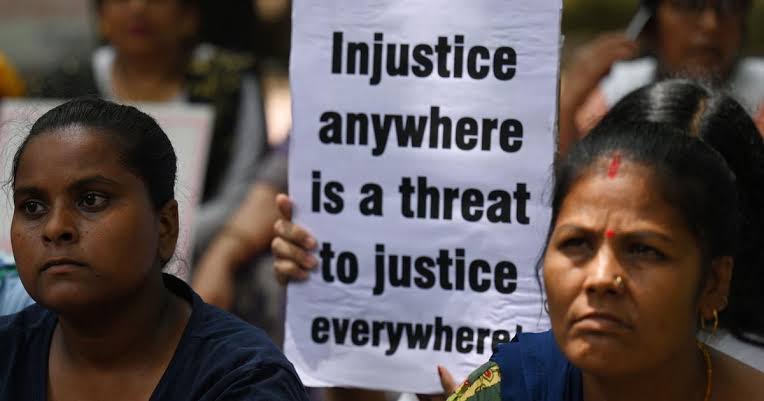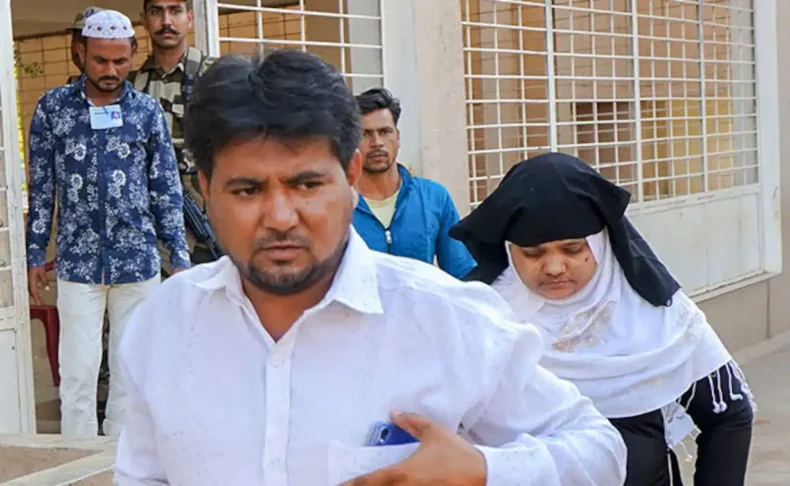According to an affidavit submitted by the Gujarat government to the Supreme Court, at least 10 of the 11 rapists responsible for the Bilkis Bano case were granted 1,000 days of parole and furlough.

Bilkis Bano and her family maintained that they were not consulted or informed about the decision to release the rapists.
On August 15, 2022, 11 men who had been convicted and sentenced to double life imprisonment for the gang rape of Bilkis Bano and murdering her child, who was six years old, were released from the Godhra jail in Gujarat. They had been serving their sentences at the time. After serving more than 14 years in prison, the state administration asserted that they were eligible for parole based on their “good conduct.”
“I am still numb”: Bilkis Bano on the release of convicts.
However, the government’s own affidavit that was given to the Supreme Court raises questions about the behavior of the convicts as well as the decision-making process that was followed by the Gujarat government and the Centre.
Prolonged Parole and Furlough Time
Ten of the eleven inmates convicted in the Bilkis Bano case were granted parole or other forms of release from prison totaling more than a thousand days. The prison administration has documented numerous inmates who “returned late” from their parole and furlough periods.
Since all eleven offenders were detained before their formal conviction and sentencing, they (each) were allowed four years of “set off” time from their incarceration, which accounts for the years between their January 2004 arrest and their January 21, 2008 sentencing.

According to the brief given by the Gujarat government to the Supreme Court, the length of “leave” enjoyed by the prisoners varies widely, from 998 days in the case of Bakabhai Khimabhai Vahoniya to 1,576 days in the case of Rameshbhai Rupabhai Chandana.
While out on parole, one inmate is being prosecuted for molestation and criminal intimidation.
A First Information Report (FIR) was filed against Mitesh Chimanlal Bhatt for the crime of molestation when he was out on parole in June 2020, as the affidavit discloses.
In the First Information Report, the perpetrators are accused of breaking sections 354 (outraging modesty of a lady), 504 (intentional insult with the aim of causing disturbance of the peace), and 506 of the Indian Penal Code (IPC). Charges have been brought against the individuals involved in this case, and the trial has already commenced in the district of Dahod.
Bhatt has been released from jail despite the fact that a case is still pending against him. This is due to the fact that the jail advisory board determined that his conduct while detained had been “outstanding” during the 281 days that followed the occurrence and the FIR.
Even though he included the FIR and the ongoing trial in his report, the Superintendent of Police Limkheda stated that he “had no objection” to his release. The Jail Advisory Group met a number of times to discuss the issue of early release for inmates, and these meetings lasted for quite some time.
Victim objects
For instance, in the case of Bilkis Bano and her family, there is a report on file indicating that the offender and his family consulted with the family of the victim over the course of the investigation. The criminal and his family live in the same hamlet as Bilkis Bano and her family.
The victim was only contacted once, according to the affidavit, and that was in the case of Radheshyam Bhagwandas Shah, who resides in the same hamlet as Bilkis Bano and her family.
Approval from the central authority took only two and a half weeks
The affidavit further states that on June 28, 2022, the Gujarat government wrote to the Home ministry requesting permission to release the prisoners, and on July 11, 2022, the MHA granted permission.

The affidavit does not reveal the Central Government’s rationale or deliberations prior to approving the premature release of the 11 prisoners, despite the fact that the letter from the Joint Secretary of the Home Ministry mentions the Central Government’s “concurrence/approval” for the premature release of the 11 prisoners.
Some concerns have been raised about the decision-making process that led to the premature release of the inmates, which is mentioned in the government’s own affidavit. In any case, the Supreme Court will hear the case on November 29.
Senior counsel and Congress leader Abhishek Manu Singhvi blasted the ruling as “a shame on this government” after Tuesday’s session.
“It is abhorrent, reprehensible, and revolting that an elected administration in a democracy chose to release rape criminals in such a casual manner,” Singhvi told India Today on Tuesday.
Read More: Doctor arrested for raping a woman in UP













